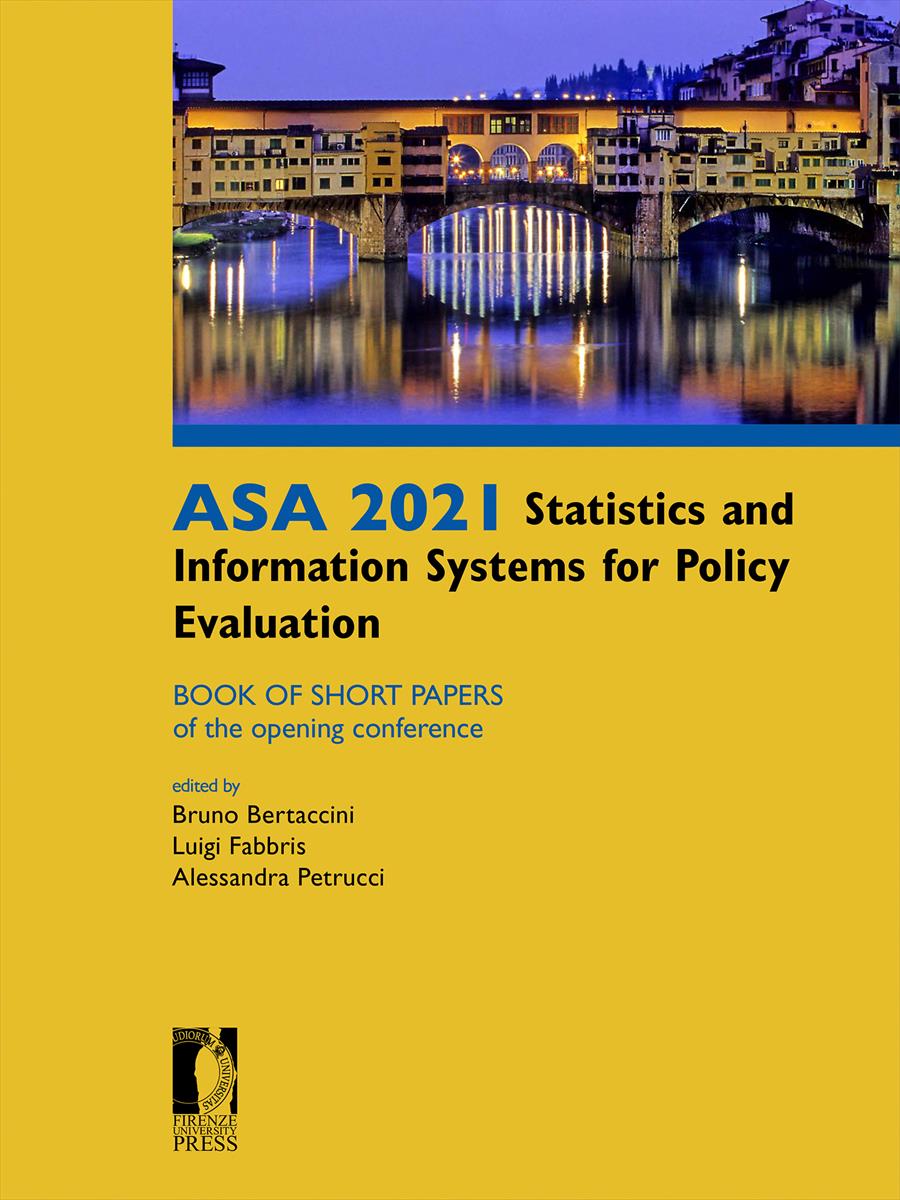- ASA 2021 Statistics and Information Systems for Policy Evaluation
- Edited by Bruno Bertaccini, Luigi Fabbris, Alessandra Petrucci
Determinants of social startups in Italy
- Lucio Palazzo
- Pietro Sabatino
- Riccardo Ievoli
- © 2021 Author(s) |
- CC BY 4.0
- DOI: 10.36253/978-88-5518-304-8.18
The so called "Startup Act" (Decree Law 179/2012, converted into Law 221/2012), has introduced in Italy the notion of innovative companies with a high technological value, denoted as the innovative startups. Among them, the Italian government includes the category of SIAVS ("Startup Innovative A Vocazione Sociale"), which represents a relatively new field of interest in both scientific and normative perspective. A social startup must satisfy the same requirement of other innovative startups, usually operating in sectors such as social assistance, education, health, social tourism and culture which can have a direct (social) impact on collective well-being. Furthermore, they must produce specific reporting of the produced social impact, enjoying also some tax benefits. In 2020 more than 200 SIAVS are registered in Italy, more than doubled with respect to 2015. This work is concerned with the empirical analysis of innovative companies focused in funding and implementing solutions to social, cultural, or environmental issues. Specifically, the aim of the paper is to investigate what are the relevant factors for the arise of SIAVS in Italy. The response variable is based on the number of active social startups in Italian provinces while the set of explanatory variables is composed by economic and demographic indicators at the provincial level. Generalized linear models (GLM) for discrete outcomes are applied and compared, even taking into account the zero-inflated issue arising due to the distribution of these particular data.
- Keywords:
- Start-up,
- Well-being,
- Provinces,
- Glm,
- zero inflated count,
- models,
University of Naples Federico II, Italy - ORCID: 0000-0001-7529-4689
University of Naples Federico II, Italy - ORCID: 0000-0002-3538-6201
University of Ferrara, Italy - ORCID: 0000-0001-9489-3564
- Agresti, A. (2003). Categorical data analysis. Second Edition (Vol. 482), John Wiley & Sons, New York (US).
- Bacq, S., Hartog, C., Hoogendoorn, B. (2016). Beyond the moral portrayal of social en- trepreneurs: An empirical approach to who they are and what drives them. Journal of Busi- ness Ethics, 133(4), pp. 703–718.
- Colombelli, A., Quatraro, F. (2019). Green start-ups and local knowledge spillovers from clean and dirty technologies. Small Business Economics, 52(4), pp. 773–792.
- Colombelli, A., Orsatti, G., Quatraro, F. (2019). Local knowledge composition and the emer- gence of entrepreneurial activities across industries: evidence from Italian NUTS-3 regions. Small Business Economics, 56, pp. 613–635.
- Deidda Gagliardo, E., Gobbo., G., Papi. L., Bigoni, M. (2017). L’efficacia dei programmi di incubazione nel successo e nel fallimento delle startup. RIREA. (5-8), pp. 225–239.
- Forum del Terzo Settore (2017). Le reti del Terzo Settore. Terzo Rapporto. Eds. Peruzzi, G. Forum Nazionale del Terzo Settore, Rome (IT), pp. 1-72.
- Greene, W.H. (1994). Accounting for excess zeros and sample selection in Poisson and negative binomial regression models. Working paper No. 94-10 Stern School of Business, New York University, New York (US), pp.1–36.
- Hoogendoorn, B. (2016). The prevalence and determinants of social entrepreneurship at the macro level. Journal of Small Business Management, 54 (sup1), pp. 278–296.
- ISTAT (2019). Struttura e profili del settore non profit. Report censimento permanente su istituzioni non profit anno 2017. ISTAT, Rome (IT), pp. 1–15.
- Maglio, M. (2019). Il framework territoriale nel processo di diffusione del fenomeno delle startup a vocazione sociale. XIII Colloquio Scientifico sull’impresa sociale, 24-25 maggio 2019, Universita` degli Studi di Roma Tor Vergata, Rome (IT), pp. 1–14.
- Lambert, D. (1992). Zero-inflated Poisson regression, with an application to defects in manu- facturing. Technometrics, 34(1), pp. 1–14.
- McCullagh, P., Nelder, J. A. (1989). Generalized linear models. Second Edition, Chapman and Hall, New York (US).
- Nelder, J. A., Wedderburn, R. W. (1972). Generalized linear models. Journal of the Royal Statistical Society: Series A (General), 135(3), pp. 370–384.
- Palazzo, L. (2019) Integer Autoregressive modeling: a new gretl routine, in Proceedings of the International Conference on the GNU Regression, Econometrics and Time-series Library, eds. F. Di Iorio, R. Lucchetti, Universita` degli studi di Napoli Federico II, Naples (IT), pp. 95–103.
- Ventura, M., Vesperi, W., Reina, R. (2018). Innovazione sociale nelle startup innovative: un approccio narrativo. Iris Network, pp. 1–18.
- Sansone, G., Andreotti, P., Colombelli, A., Landoni, P. (2020). Are social incubators different from other incubators? Evidence from Italy. Technological Forecasting and Social Change, 158, pp. 120–132.
- Vesperi, W., Lenzo, P. (2016). La start-up innovativa a vocazione sociale e il documento di de- scrizione dell’impatto sociale: una comparazione di casi. Colloquio scientifico sull’impresa sociale, 10-11 giugno 2016, Universita` degli studi di Napoli Federico II, Naples (IT), pp. 1–18.
- Vesperi, W., D’Aleo, V., Morabito, G., Lo Bue, S. (2015). Imprenditorialita` vs. responsabilita` sociale: La startup innovativa a vocazione sociale. Colloquio scientifico sull’impresa sociale, 22-23 maggio 2015, Universita` degli studi Mediterranea di Reggio Calabria, Reggio Calabria (IT), pp. 1–14.
- Vuong, Q. H. (1989). Likelihood ratio tests for model selection and non-nested hypotheses. Econometrica: Journal of the Econometric Society, 57(2) pp. 307–333.
Chapter Information
Chapter Title
Determinants of social startups in Italy
Authors
Lucio Palazzo, Pietro Sabatino, Riccardo Ievoli
Language
English
DOI
10.36253/978-88-5518-304-8.18
Peer Reviewed
Publication Year
2021
Copyright Information
© 2021 Author(s)
Content License
Metadata License
Bibliographic Information
Book Title
ASA 2021 Statistics and Information Systems for Policy Evaluation
Book Subtitle
Book of short papers of the opening conference
Editors
Bruno Bertaccini, Luigi Fabbris, Alessandra Petrucci
Peer Reviewed
Publication Year
2021
Copyright Information
© 2021 Author(s)
Content License
Metadata License
Publisher Name
Firenze University Press
DOI
10.36253/978-88-5518-304-8
eISBN (pdf)
978-88-5518-304-8
eISBN (xml)
978-88-5518-305-5
Series Title
Proceedings e report
Series ISSN
2704-601X
Series E-ISSN
2704-5846
